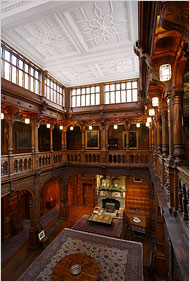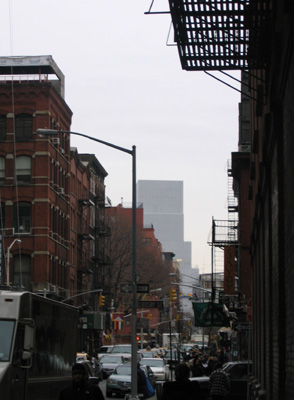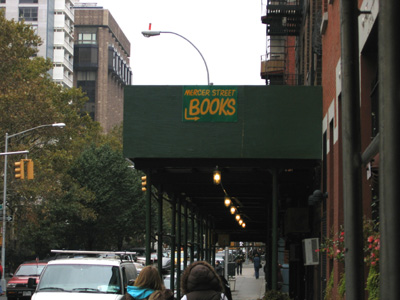Friday Movies: Juno
Saturday, January 12th, 2008Although ill, I did squeak over to the movies yesterday. (Podcasts will resume presently.)
¶ Juno.
Although ill, I did squeak over to the movies yesterday. (Podcasts will resume presently.)
¶ Juno.
It was too cold, yesterday, to wander far from home in search of film fare, so I didn’t head downtown for The Orphanage or across town for There Will Be Blood. So I went across the street and gorged on the latest box of romantic comedy from Hollywood. Tears poured out of my eyes all though the movie, so perhaps it was in revenge that I came home and dished it. Don’t listen to me, though. Be sure to see Hilary Swank pull off another boffo performance.
¶ PS I Love You.
‘Tis the season to empty out cupboards and closets of seasonal boxes. And this year, we’re doing it!
These amiable creatures, representing characters from Alice in Wonderland and The Nutcracker, come from a midtown shop called The Gazebo, where you could have quilts made to order. (The shop is no longer with us.) Stuffed dolls make for odd Christmas tree ornaments — they’re a little on the large side, for one thing — but we’ve come to love them. One year, we even gave them their own small tree.
We’re much too low-key to do anything like that now.
Meanwhile, at the movies:

Jonathan Player for The New York Times
A friend asked me, at lunch on Thursday, if I was keen to see Atonement, and I said that I wasn’t. And that was true — until I discovered that Atonement would be showing across the street at ten the next morning.
I liked it better than I thought I would, but I understood the critics’ reservations. (The critics I had in mind are A O Scott of the Times and Anthony Lane of The New Yorker.) I also bore in mind something that an executive producer said of the adaptation: “The one thing movies don’t do particularly well is consciousness, and the book is largely about consciousness.” The EP in question was author Ian McEwan.
¶ Atonement.

The new New Museum – a chimerical presence at the end of Prince Street.
Despite an indifferent review in the Times, I went back to the Angelika this week for Paul Schrader’s The Walker. What did I find when I got there? A shuttered box office. Along with two other hardy souls, I waited in the cold for the place to open, unsure that it would. If I hadn’t had plenty of strange and funky experiences at other movie houses, I’d begin to wonder if the Angelika was the place to catch the first show of the day. The escalator hadn’t been turned on. Once again, mistakes about choice of lens were made in the projection booth. For a solid four minutes of one of the film’s most suspenseful moments, the picture was split across the middle, so that Kristin Scott Thomas’s uncertain smile floated above her eyes. I wish that that sort of thing were more unusual than it is.
The cloud cover must have been very thick, because it didn’t seem to be quite daylight. The narrow streets of SoHo and NoLIta were off-puttingly umbrous; I felt that I was in a not-quite-right dream. The subways, in contrast, were their jolly regular selves. On the way down, I “walked” my way to the front of the train, advancing a car at every station except Grand Central until, at 33rd Street, I reached the first car. This is a game that I play every week, to the extent that a train is at the station when I swing through the turnstiles.* For much of the trip back uptown, I was entertained by two German men who were talking about something that I never caught the gist of. Both ways, I read Tim Blanning’s The Pursuit of Glory, which has finally grabbed me hard enough that I’m willing to carry a heavy book around. (On the plus side, it’s an ideal luncheon companion, because its pages lay flat when it’s open.)
¶ The Walker.
* The exits at the downtown Bleecker Street station are the front and the rear of the platform. Leaving by the front, one traverses a long concourse over the IND tracks and climbs out at the corner of Broadway and Houston, only a block away from the Angelika.

This house on East 87th Street is part, I believe, of the Holy Trinity complex.
On my way down to the Angelika to see The Savages yesterday morning, I was flushed with the comfortable expectation of a very satisfying time at the movies, which might have seemed a bit odd in view of the story that the film has to tell, but which made perfect sense given the really tremendous cast that would be entertaining me for a few hours. It seems only yesterday that I saw Philip Seymour Hoffman in Before the Devil Knows You’re Dead, and, indeed, it was only the month before last. According to IMDb, Laura Linney shot The Savages before working on Breach and The Nanny Diaries, both of which came out earlier this year. These two are so busy making great films that you’d think we were back in the old studio days (anywhere but at MGM, that is).
Interestingly — but not, I think, importantly, at least in a film that is really focused on Ms Linney’s character — Mr Hoffman plays a college professor who teaches Brecht and the theatre of alienation. Brecht didn’t want his audiences to feel comfortable, he tells his class; he wanted an argument (I’m conflating two sentences here). My, but it’s nice to have outlived all of that! There is little enough danger these days of being smothered in bourgeois comfort. Â
¶ The Savages.

The old seawall at the base of East 81st Street.
There were two choices yesterday morning, and both began at the stroke of eleven – in theory (in practice, the Angelika can be pretty ramshackle). There was Love in the Time of Cholera, with the beautiful Giovanna Mezzogiorno, and I’d have seen that if it hadn’t been so much longer than Margot at the Wedding, which got a much better review in the Times than it did in The New Yorker.
For the first time this year, the air was crisp with winter, and all I could think of, as I waited for the light at Broadway and Houston, was Christmas presents. Christmas presents of the past, that is – of childhood. (Kathleen and I have renounced such pagan rituals as the exchange of stuff at Yuletide.) But what a conundrum: I wouldn’t even want the toys that so excited my lust (and that I never received) when I was eight, nine, and ten that I still think of them when a chill in the air suggests that it just might snow.

Le bouquiniste dans la rue Mercer.
What I couldn’t figure out was why a film starring Ryan Gosling, with Emily Mortimer and Patricia Clarkson among others, about a guy who dates an inflatable doll was showing at the art houses. On the one hand, there was the weirdness factor – that made sense. On the other, there was the awful review in the Times (“100% pure calculation”). which made the movie sound untouchable by highbrow venues. Lars and the Real Girl was at least something of a puzzle going in, which nothing else showing at the moment was. So I got on the 6 and went down to see it at the Angelika.
Afterwards, I had a teeny tiny adventure, which I turned into a shaggy dog story as soon as I got home. I have been feeling my inner Maeve Brennan lately – although I have a long way to go before I’m as eloquent as the Long-Winded Lady.
¶ Left Behind.
My choices yesterday – since I wanted to stay in the neighborhood, so that I could have lunch at the museum afterward and take a look at some of the new shows that have opened this Fall – were American Gangster and Dan in Real Life. I chose the latter, because American Gangster was berated by everyone save (predictably) the Wall Street Journal for its faulty moral compass. Well, the same might be said of Dan in Real Life, although I’m probably going to be the only one to say it. Dan in Real Life is obviously about a family of professional-class people, but all explicit references to such a background have been effaced, presumably in the interest of making more proletarian audiences feel at home with the comedy.  The class neutrality of Dan in Real Life amounts to the outright denial of intelligence as a virtue, and I found it both irritating and offensive. Â
¶ Dan in Real Life.
For the first time in a long time, I came home for lunch after the movies. I didn’t go to Jacques, as usual when I’m doing in Soho – although I did stop in at McNally Forbes to pick up a book for a friend. I could have gone on down Prince Street to the bistro, but I wasn’t really in the mood, so I headed north on Mulberry Street and just caught the Uptown Six. When I got home, I made myself a hot dog – just one. Not all that long ago, I would never make fewer than three hot dogs for lunch. More recently, I contented myself with two. Sometime in August, I decided that one would do.
I suspect that the prospect of sipping on martinis at lunch in a French-style bistro was a powerful draw. I don’t worry that finding myself in a bistro will alter my resolve to avoid hard liquor. But somehow, without the one, the other is no longer so compelling.
Sidney Lumet’s movie, though – now that was compelling.
It was going to be either Lust – Caution, showing at eleven, or We Own the Night, at a quarter past, depending on when I got to the Landmark Sunshine Theatre on Houston Street. Unfortunately, that’s not how it was going to be, though, because I’d neglected to click “Tomorrow” when I’d consulted the Internet on Thursday night for showtimes. In the event, it was Lust – Caution at noon, and We Own the Night at a quarter to. Given the later starting times, I chose We Own the Night, as the far shorter film. Hic transit important aesthetic decisions.
After lunch, I went round to my favorite bistro, to find it packed. Never had I seen such a crowd there on one of my Friday afternoon forays into NoLIta. What’s more, many of the patrons were speaking French and carrying shopping bags. The falling dollar ends up improving the Manhattan ambience. I love the French, but as linings go, this one is bronze at best, not silver.
¶ We Own the Night.
Yesterday, my great friend Kate, who has just retired after being, like Kathleen, too busy to live life as we know it, took me to lunch, to celebrate my speedy recovery and to catch up on the new Daily Blague &c &c. It was all about me, I’m afraid. But because Kate wanted to lunch on the early side, I decided to ditch the idea of a first-thing-in-the-morning movie in favor of taking Kathleen to see a late-ish showing of Michael Clayton, which is playing across the street. It was midnight when we got home, but I asked Kathleen if she’d mind if I had a glass of wine and composed some “notes” on the film. She assented, but I don’t really do “notes.” I ended up writing about three quarters of the finished piece more or less as it stands – and, suddenly, it was two in the morning.
I was sure that I’d ruined my carefully reconstructed bedtime rituals, but, no; a few pages of a book that I’m about to finish, with the greatest interest, knocked me out cold. The only hitch was that, when I woke up at five, I had to remember just when I’d gone to sleep, and crawl back into bed.
So we’re having a late Saturday. I’ve read the Book Review, polished off my piece about Michael Clayton, and recorded the PodCasts. There’s a fresh pot of coffee in the Chemex if anybody wants some.
¶ Michael Clayton, at Portico.
A sordid confession: I almost fell asleep well into The Darjeeling Limited yesterday. I blame this on early hours and a diet of painkillers, but you may draw other conclusions. I did manage to eat all my popcorn; maybe I needed a post-prandial snooze. But it is also true that I had given up, by this point, on the possibility of seeing something new and different. It’s an awful thought, but there is nothing about Owen Wilson’s role or performance in Wes Anderson’s latest film that would make a suicide attempt seem improbable.
I did tell Fossil Darling that I wasn’t recommending the movie to him, because if he took me up on a good recommendation, he would first shoot everyone else in the audience before hunting me down with his snicker snee.
Can it possibly be true that smoking is no longer permitted on Indian trains?
Podcasts:
(Note: As the first “real” podcast at The Daily Blague, I resolved to upload the first take, no matter how much it might be improved. One learns little from preliminary perfectionism. I, in contrast, learned a lot – but I’m letting the recording stand, warts and all. For some reason, I call the character played by Owen Wilson, Francis, “Patrick.” That’s the sort of thing that I’ll be cleaning up ahead of time in future. And I shall try to get the volume louder. )
Going to the movies within days of discharge from the hospital – a good idea? Because I was determined, for safety’s sake, not to leave the neighborhood, there were only two possibilities, but one of them, Eastern Promises, just looked too uncongenial for a convalescent, chipper though I’ve been. In the Valley of Elah didn’t start until one, which would ordinarily be a mark against it, but my time is a little more flexible now that I’m forbidden to do 90% of the things that make this apartment bearable. In the event, Elah was showing at two, and the theatre that lies in the other direction. I spent the intervening hour cleaning the desk in the bedroom, which was dustier than the most neglected corner.
I’d promised to call Kathleen when I got to the theatre at one. Instead, I called when I got back to the apartment, promising when I got to the theatre at two. This I forgot to do. I called the moment I was back out in the street, but the damage had been done. “I finally gave up being sick about your lying in the street, thinking that somebody must have called.” Ouch. I really deserved that.
The movie that I did see was, I think, just about the perfect film for me today. I’ve been a fan of Tommie Lee Jones since The Eyes of Laura Mars. He was more promising than great in that extravagant portrait of New York City’s Titanic period, but he has borne forth more and more of his promise with every film that he has added to his list. In the Valley of Elah puts him, without a doubt, in the company of Newman and Redford – men who can convey all the sorrow and disappointment of American life without opening their mouths.
¶ In The Valley of Elah.
It occurs to me that I’ve never said anything about three movies that I saw last month, in at least one case on the same day as a movie that I did write up. They were: No Reservations, The Bourne Ultimatum, and The Nanny Diaries. These were all films that I wanted to see – and so did Kathleen, so she clawed out the time to go. I remember that, after The Bourne Ultimatum, she suggested that we have lunch at the Lexington Candy Shop. where the menus announced that two films had been shot there: The Day of the Condor, which of course we knew about, and The Nanny Diaries. Intrigued, and wondering why I hadn’t seen anything about The Nanny Diaries, I went straight to the Video Room and made a fool of myself with a short clerk who can’t stand me by asking for the DVD. The movie hadn’t even come out.
Of the three, The Nanny Diaries most deserved a write-up, if only because it seemed so wildly misjudged by the critics, who didn’t think that Scarlett Johansson was right for the part. Neither Kathleen nor I could understand that; she seemed perfect. And she was a natural foil for Laura Linney, who can do repression so well that you feel sorry for her proper women who believe that it is vital to play by the rules. Ms Johansson’s nanny was adorably flaky, not about her job but about her future. And the kid, played by Nicholas Reese Art, was adorable, too. Kids usually aren’t. Not to me. (See below.)
What’s there to say about a movie like The Bourne Ultimatum? “Wow”? “It’s great fun”? “The acting is super”? All three statements are true. Say another word, though, and you spoil the fun for someone else.
No Reservations will be, I hope, Adam Eckhart’s breakout role. Of course, after all this time, it may be that Mr Eckhart is never going to have a breakout role. But in this film, he’s the nice guy to Catherine Zeta-Jones’s heavy. For once, there isn’t a thing that you can say against the character he plays. Mr Eckhart’s repertoire of bastards, some likeable, some detestable, appears to have kept audiences at a distance. There’s no other explanation for the fact that this great actor is not a superstar, George Clooney’s cutup cousin. No Reservations is a charming romantic comedy with dampened screwball elements – Ms Zeta-Jones, lovely as ever and here quite convincing as a thoughtful, driven chef, is simply not built for the speed of screwball. Every time they had a scene together, Mr Eckhart made Abigail Breslin a lot easier to put up with.
What I wanted to see this morning was Romance and Cigarettes, the star-studded movie by John Tuturro. But it wasn’t showing at the Film Forum until one o’clock in the afternoon. I can’t wait until one o’clock to go to the movies, especially as I prefer to have lunch afterward. Fierce People was tempting, but not tempting enough to override the siren call of a train ride to the Lower East Side, where The Nines was showing at the Sunshine. Actually, I was up for the thrill of finding out whether Ryan Reynolds, an actor completely unknown to me, could carry a movie that many critics have spoken of as an updated Twilight Zone. (Which it’s not.) He can.
Afterward, I went over to my favorite downtown bistro, where, aside from the manager, everyone was new and confusion seemed to be the order of the day. It wasn’t until my second martini that I thought to ask after the croque monsieur that, ordinarily, would have made its appearance. The waiter, it turned out, hadn’t grasped that part of my order, probably because he was transfixed by the effort to get the martini specifications right. I miss the days when there was only one kind of martini: the kind I like.
On the way home, I drifted dangerously near to McNally Robinson, but I steered clear. No new books today, no sir.
¶ The Nines.
A few years ago, the husband of one of Kathleen’s camp friends was posted to Sấo Paolo, and she hated it. She hated, specifically, the insecurity of life. The wariness at traffic intersections, where some drivers might not mind the signals. The wariness at traffic intersections, where one’s children might be kidnapped. I cannot wait to discuss Jason Kohn’s Manda Bala (Send a Bullet) with her.
It seems wrongheaded to call the film a documentary, although that’s what it is. It’s too vivid and extreme. There are parts that will make you wish that you were at a slasher flick. That it’s all true is what makes it truly sickening. But the sickening part comes afterward, when you think about the movie, and that’s all to the good, because what has happened in Sấo Paolo could happen here. The movie itself is a shiny bauble. The sound track is extremely wry.
I’m going to scold on this one: you ought to see this movie.
¶ Manda Bala.
Our cold and gloomy weather came to an end overnight, and although it wasn’t blisteringly hot, we were back in August. I had promised myself that, if it were still showing, I’d see Christophe Honoré’a Dans Paris, even though that would mean going to the IFC theatre for the first time. Shocking – but I hadn’t yet been. With the small independent theatres, I never know what to expect, and I’ve been feeling rather unadventurous lately, probably because, ahem, I’ve been launching a new site. Curiously, what sold me on Dans Paris was the late first show, at 12:40. Ordinarily, that’s far too late for me to be starting the day, but it was just right this morning. I took the 6, the V, and D trains to West Fourth Street, and didn’t get there a moment too soon.
Afterward, I ambled up West Fourth to Seventh Avenue, where I had lunch at the Riviera Café, a survivor that I last visited in the early Eighties. After reading a bunch of pieces in The London Review of Books – including Jenny Diski’s brightly scathing review of the latest book about Princess Margaret – I paid the bill and caught the train at Sheridan Square. I took the 1, the S, and the 6, and I got to 86th Street with plenty of time for Barnes & Noble. Note to Max: I finally have a Robert!*
¶ Dans Paris.
*Collins Robert French Unabridged Dictionary.
Last Friday, I saw Death at a Funeral. First thing on Saturday morning, I went to a funeral. Happily, the funeral was not as funny at the movie. It wasn’t funny at all. Everything happened according to plan. There was none of the alarming, sidesplittingly funny mayhem that fills Frank Oz’s instant classic.
Yesterday, I had a big day. I went to the movies in the morning and to a baseball game at night. It was a very lucky day for anyone to have. Most readers will probably be surprised about the baseball part. So am I.
¶ 2 Days in Paris.